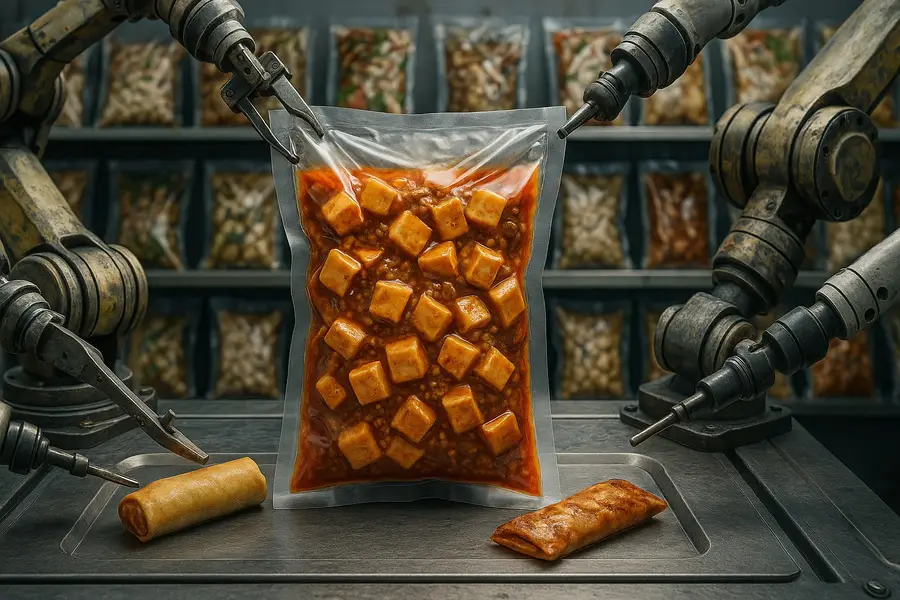Is serving too fast a sin? The Chinese paradox of pre-made foods

A recent ‘scandal’ involving a major restaurant chain is raising the question of whether China’s proud food culture can digest an industrialized dining revolution
By Lee Shih Ta
Whenever a dish arrives too quickly in today’s Chinese restaurants, diners can’t help wondering if it was made from scratch, or more possibly pre-made somewhere else.
Many well-known chains are facing criticism over pre-made meals. Northwestern-cuisine chain Xibei Youmian Village was recently accused by a famous blogger of using semi-finished food prepared in centralized kitchens, triggering a nationwide backlash. Overnight, the long-praised ideal of restaurant standardization suddenly turned into a crisis of trust. Many Chinese diners react almost instinctively to the notion of pre-made food, believing mass-produced, industrial cooking insults the country’s culinary heritage.
Ironically, the government feels just the opposite. Since its issue of a national document proposing the “cultivation and development of the pre-made-dish industry” in 2023, such food has been framed as a new form of “advanced productive force” that can modernize agriculture, expand cold-chain logistics and support rural revitalization.
Guangdong province began implementing a “General Requirements for the Labeling of Cantonese Pre-Made-Dish Packaging” rule this year, mandating disclosure of production methods and reheating instructions, while planning multiple industrial parks. To policymakers, pre-made food epitomizes a form of supply-chain upgrade — from farm to table — shortening processes, stabilizing quality, reducing waste and creating new jobs and export potential.
Yet the policy push doesn’t quite suit the public’s taste.
Efficiency tastes like betrayal
Also under fire is the once-trendy Tai Er Sauerkraut Fish chain. Some diners complain that three dishes can appear within seven minutes, suspecting the chain of using pre-sliced fish and ready-made broth rather than freshly killing each fish to order.
Tai Er’s parent, Jiumaojiu (9922.HK), reported a 10% drop in revenue and a 16% decline in net profit in the first half of this year, with table turnover falling to 2.2 times per day. Same-store sales at Tai Er’s directly operated restaurants fell 19% year-on-year. The company’s stock has dropped 40% since the beginning of the year.
Both Jiumaojiu and Xibei have denied using pre-made food — Tai Er insists its fish are delivered daily and marinated in-store, while Xibei claims its central kitchen only handles “pre-processing.”
This is the industry’s subtle gray zone: Under the official definition, only dishes that are fully cooked, packaged, and the later reheated for consumption count as pre-made. But in consumers’ eyes, anything not stir-fried by an on-site chef already fits their own pre-made definition. That perception gap turns standardization itself into an offense.
According to Wind data and a media report, 31 companies in China’s domestic A-share market are classified as pre-made food concept stocks, and about 60% have seen declining business over the past year. In 2024, net profits fell year-on-year for 22 of these companies. Weizhixiang (605089.SH), known as “China’s first pre-made food stock,” has seen its shares drop about 73% from their peak.
Why, then, does China persist in advancing this controversial sector? The answer is simple: as labor costs rise, urbanization accelerates, and food-safety rules tighten, pre-made food offers efficiency, traceability, and stable supplies.
For policymakers, it’s part of a modern food-manufacturing system — akin to electric vehicles or smart factories — representing a productivity upgrade. The problem is that Chinese dining culture is built on the immediacy of using a wok — creating dishes that are freshly cooked, smoky and alive. When the state openly promotes “pre-made dishes on the table,” ordinary diners hear a subtext: that bowl of noodles you’re eating might have been made in a factory far away. Such “de-localization” of cooking only heightens psychological resistance.
To be sure, Chinese consumers are not universally opposed to pre-made food. Many embrace it in the context of fast-food chains like McDonald’s or KFC, where industrial efficiency is expected and even celebrated. But when it comes to restaurants that market themselves as serving up Chinese culinary heritage — those emphasizing craftsmanship, freshness and the “wok spirit” — the use of pre-made dishes feels like a violation of cultural authenticity.
And that is the most delicate paradox of pre-made food. It marks the inevitable modernization of China’s dining industry, yet also crosses the deepest emotional boundary for many Chinese consumers. If one day restaurants can make people forget the words “pre-made” while tasting what they’re eating, then — and only then — will pre-made dishes truly find a place in the hearts and stomachs of Chinese diners.
Lee Shih Ta is an editor at Bamboo Works.
You can contact him at shihtalee@thebambooworks.com
To subscribe to Bamboo Works weekly free newsletter, click here





